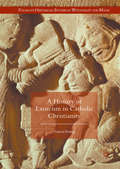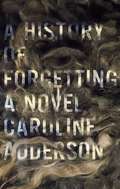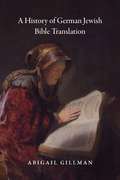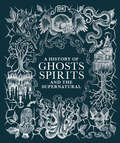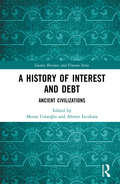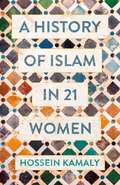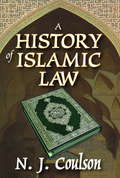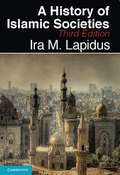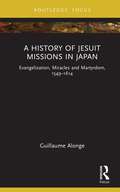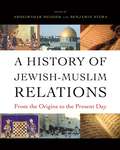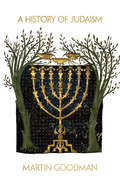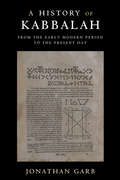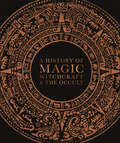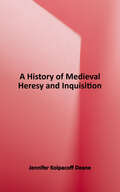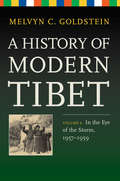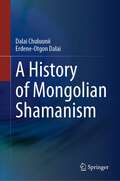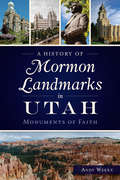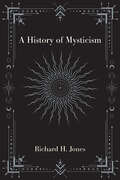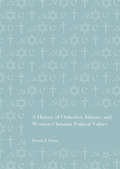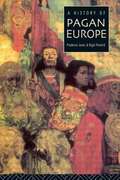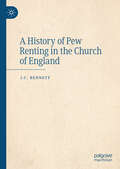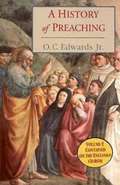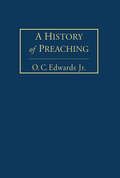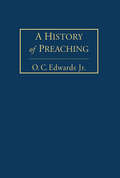- Table View
- List View
A History of Exorcism in Catholic Christianity (Palgrave Historical Studies in Witchcraft and Magic)
by Francis YoungThis book traces the development of exorcism in Catholic Christianityfrom the fourth century to the present day, and seeks to explain why exorcismis still so much in demand. This is thefirst work in English to trace the development of the liturgy, practice andauthorisation of exorcisms in Latin Christianity. The rite of exorcism, and theclaim by Roman Catholic priests to be able to drive demons from the possessed,remains an enduring source of popular fascination, but the origins and historyof this controversial rite have been little explored. Arguing that belief inthe need for exorcism typically re-emerges at periods of crisis for the church,Francis Young explores the shifting boundaries between authorised exorcisms andunauthorised magic throughout Christian history, from Augustine of Hippo toPope Francis. This book offers the historical background to - and suggestsreasons for - the current resurgence of exorcism in the global Catholic Church.
A History of Forgetting
by Caroline AddersonMalcolm, an aging hairdresser, is reclusive and bitter. Alison, a salon apprentice, is dismissed by Malcolm for her embarrassing innocence. When their colleague is murdered by neo-Nazis, however, the two embark on an unplanned pilgrimage to Auschwitz. A moving and sharp-edged novel by the award-winning author of Ellen in Pieces.
A History of German Jewish Bible Translation
by Abigail GillmanBetween 1780 and 1937, Jews in Germany produced numerous new translations of the Hebrew Bible into German. Intended for Jews who were trilingual, reading Yiddish, Hebrew, and German, they were meant less for religious use than to promote educational and cultural goals. Not only did translations give Jews vernacular access to their scripture without Christian intervention, but they also helped showcase the Hebrew Bible as a work of literature and the foundational text of modern Jewish identity. This book is the first in English to offer a close analysis of German Jewish translations as part of a larger cultural project. Looking at four distinct waves of translations, Abigail Gillman juxtaposes translations within each that sought to achieve similar goals through differing means. As she details the history of successive translations, we gain new insight into the opportunities and problems the Bible posed for different generations and gain a new perspective on modern German Jewish history.
A History of Ghosts, Spirits and the Supernatural (DK A History of)
by DKDiscover the spine-chilling history of ghosts and the supernatural across the world in this illustrated guide.A History of Ghosts, Spirits and the Supernatural charts the extraordinary narrative of one of the most fascinating and controversial subjects in the world, covering everything from Neolithic ancestor worship and ancient necromancy to modern-day ghost-hunting and creepypasta tales and from the Japanese onryo to the La Llorona of Latin America.The perfect introduction to the subject, this spellbinding volume details the numerous ways in which spirits and the spirit world have been depicted in myth and religion, folklore, art, and literature.In this ghostly novel, you will find: Recounts of infamous tales of haunted houses and ghost ships, séances and mediumships, poltergeists, possessions, and demonic encounters.Feature profiles for other ghostly or undead beings, such as vampires and werewolves.The numerous reasons that ghost stories and tales of the uncanny are a common feature of cultures the world over.A serious but reader-friendly overview of a fascinating and controversial subject that explores the supernatural across the world and throughout history.The most holistic history of the subject available, A History of Ghosts, Spirits, and the Supernatural will shock and delight you in equal measure - whether you are a believer or a skeptic.
A History of Interest and Debt: Ancient Civilizations (Islamic Business and Finance Series)
by Murat UstaoğluWith the spread of interest-based transactions, major problems such as inequality, poverty and debt-based slavery have emerged. Those who practiced professions such as usury have, despite the negative connotations attributed to them, contributed extensively to the construction of the conventional financial system in the global economy, suggesting that the core concepts in this practice need to be analyzed in greater depth and from a historical perspective. This book analyzes the evolution of interest-bearing debt transactions from ancient times to the era of Abrahamic religions. In modern times, interest is strictly prohibited by Islam, but this book demonstrates that it is a practice that has been condemned and legally and morally prohibited in other civilizations, long before Islam outlawed it. Exploring the roots of this prohibition and how interest has been justified as a viable practice in economic and financial transactions, the book offers deep insight into the current nature of finance and economics, and the distinctive features of Islamic finance in particular and enables researchers to further delve into a review of interest-free financing models. Islamic finance, or alternative financial methods, have become extremely popular particularly in the aftermath of global financial crises, suggesting that they will attract further interest in the future as well. The book is primarily aimed at undergraduate and graduate students but, as it avoids the use of technical jargon, it also speaks to a general readership. It will appeal to those who have an interest in financial history, particularly the history of debt as well.
A History of Islam in 21 Women
by Hossein KamalyBeginning in seventh-century Mecca and Medina, A History of Islam in 21 Women takes us around the globe, through eleventh-century Yemen and Khorasan, and into sixteenth-century Spain, Istanbul and India. From there to nineteenth-century Persia and the African savannah, to twentieth-century Russia, Turkey, Egypt and Iraq, before arriving in present-day Europe and America. From the first believer, Khadija, and the other women who witnessed the formative years of Islam, to award-winning architect Zaha Hadid in the twenty-first century, Hossein Kamaly celebrates the lives and groundbreaking achievements of these extraordinary women in the history of Islam.
A History of Islamic Law (Islamic Surveys Ser.)
by N. CoulsonLawyers, according to Edmund Burke, are bad historians. He was referring to an unwillingness, rather than an inaptitude, on the part of early nineteenth-century English lawyers to concern themselves with the past: for contemporary jurisprudence was a pure and isolated science wherein law appeared as a body of rules, based upon objective criteria, whose nature and very existence were independent of considerations of time and place. Despite the influence of the historical school of Western jurisprudence, Burke's observation is generally valid for Middle East studies. Muslim jurisprudence in its traditional form provides an extreme example of a legal science divorced from historical considerations. Law, in classical Islamic theory, is the revealed will of God, a divinely ordained system preceding, and not preceded by, the Muslim state controlling, but not controlled by, Muslim society. There can thus be no relativistic notion of the law itself evolving as an historical phenomenon closely tied with the progress of society. The increasing number of nations that are largely Muslim or have a Muslim head of state, emphasizes the growing political importance of the Islamic world, and, as a result, the desirability of extending and expanding the understanding and appreciation of their culture and belief systems. Since history counts for much among Muslims and what happened in 632 or 656 is still a live issue, a journalistic familiarity with present conditions is not enough; there must also be some awareness of how the past has molded the present. This book is designed to give the reader a clear picture. But where there are gaps, obscurities, and differences of opinion, these are also indicated.
A History of Islamic Societies
by Ira LapidusThis new edition of one of the most widely used course books on Islamic civilizations around the world has been substantially revised to incorporate the new scholarship and insights of the last twenty-five years. Ira Lapidus' history explores the beginnings and transformations of Islamic civilizations in the Middle East and details Islam's worldwide diffusion. The history is divided into four parts. Part I is a comprehensive account of pre-Islamic late antiquity; the beginnings of Islam; the early Islamic empires; and Islamic religious, artistic, legal and intellectual cultures. Part II deals with the construction in the Middle East of Islamic religious communities and states to the fifteenth century. Part III includes the history to the nineteenth century of Islamic North Africa and Spain; the Ottoman, Safavid and Mughal empires; and other Islamic societies in Asia and Africa. Part IV accounts for the impact of European commercial and imperial domination on Islamic societies and traces the development of the modern national state system and the simultaneous Islamic revival from the early nineteenth century to the present.
A History of Jesuit Missions in Japan: Evangelization, Miracles and Martyrdom, 1549–1614 (Young Feltrinelli Prize in the Moral Sciences)
by Guillaume AlongeIn the aftermath of the religious crisis triggered by the Protestant Reformation, the Catholic Church set out to conquer faithful in new territories. The first missionaries to arrive in Japan were the Jesuits who were forced to adopt a different type of evangelization, with a bottom-up rather than a top-down approach. This volume shows that Japan turned out to be a land of experimentation and development of a global Catholicism, as well as an unprecedented laboratory of encounter between political, scientific and religious cultures in the age of the first globalization. It analyzes the different conversion strategies developed by the Jesuit fathers toward various groups, including samurai, Buddhist bonzes and Japanese peasants. A key step was the appropriation of sacred space by the missionaries: first in a violent way with the construction of large crosses and the destruction of temples, pagodas and pagan idols, then through strategies more flexible and accommodating of replacing pre-existing cultural practices. To be attractive, the Jesuit fathers had to compromise with local culture and spirituality, but they were also forced, in some way, to simplify and modify their very way of understanding and living Christianity. This book also reflects on the reasons for the failure of this ambitious Catholic conversion project: the hostility of the Japanese ruling class, the irreducibility of a different culture and spirituality, but also, if not above all, the rise of internal rivalries in Catholicism between Jesuits, Franciscans and Dominicans. This book marks a significant contribution to the literature on the history of the Jesuits, Catholic missions and Christianity in Japan.
A History of Jewish-Muslim Relations: From the Origins to the Present Day
by Meddeb AbdelwahabThe first encylopedic guide to the history of relations between Jews and Muslims around the worldThis is the first encyclopedic guide to the history of relations between Jews and Muslims around the world from the birth of Islam to today. Richly illustrated and beautifully produced, the book features more than 150 authoritative and accessible articles by an international team of leading experts in history, politics, literature, anthropology, and philosophy. Organized thematically and chronologically, this indispensable reference provides critical facts and balanced context for greater historical understanding and a more informed dialogue between Jews and Muslims.Part I covers the medieval period; Part II, the early modern period through the nineteenth century, in the Ottoman Empire, Africa, Asia, and Europe; Part III, the twentieth century, including the exile of Jews from the Muslim world, Jews and Muslims in Israel, and Jewish-Muslim politics; and Part IV, intersections between Jewish and Muslim origins, philosophy, scholarship, art, ritual, and beliefs. The main articles address major topics such as the Jews of Arabia at the origin of Islam; special profiles cover important individuals and places; and excerpts from primary sources provide contemporary views on historical events.Contributors include Mark R. Cohen, Alain Dieckhoff, Michael Laskier, Vera Moreen, Gordon D. Newby, Marina Rustow, Daniel Schroeter, Kirsten Schulze, Mark Tessler, John Tolan, Gilles Veinstein, and many more.Covers the history of relations between Jews and Muslims around the world from the birth of Islam to todayWritten by an international team of leading scholarsFeatures in-depth articles on social, political, and cultural historyIncludes profiles of important people (Eliyahu Capsali, Joseph Nasi, Mohammed V, Martin Buber, Anwar Sadat and Menachem Begin, Edward Said, Messali Hadj, Mahmoud Darwish) and places (Jerusalem, Alexandria, Baghdad)Presents passages from essential documents of each historical period, such as the Cairo Geniza, Al-Sira, and Judeo-Persian illuminated manuscriptsRichly illustrated with more than 250 images, including maps and color photographsIncludes extensive cross-references, bibliographies, and an index
A History of Judaism: From Its Origins to the Present
by Martin GoodmanA sweeping history of Judaism over more than three millenniaJudaism is one of the oldest religions in the world, and it has preserved its distinctive identity despite the extraordinarily diverse forms and beliefs it has embodied over the course of more than three millennia. A History of Judaism provides the first truly comprehensive look in one volume at how this great religion came to be, how it has evolved from one age to the next, and how its various strains, sects, and traditions have related to each other.In this magisterial and elegantly written book, Martin Goodman takes readers from Judaism's origins in the polytheistic world of the second and first millennia BCE to the temple cult at the time of Jesus. He tells the stories of the rabbis, mystics, and messiahs of the medieval and early modern periods and guides us through the many varieties of Judaism today. Goodman's compelling narrative spans the globe, from the Middle East, Europe, and America to North Africa, China, and India. He explains the institutions and ideas on which all forms of Judaism are based, and masterfully weaves together the different threads of doctrinal and philosophical debate that run throughout its history.A History of Judaism is a spellbinding chronicle of a vibrant and multifaceted religious tradition that has shaped the spiritual heritage of humankind like no other.
A History of Kabbalah: From the Early Modern Period to the Present Day
by Jonathan GarbThis volume offers a narrative history of modern Kabbalah, from the sixteenth century to the present. Covering all sub-periods, schools, and figures, Jonathan Garb demonstrates how Kabbalah expanded over the last few centuries, and how it became an important player, first in the European, subsequently in global cultural and intellectual domains. Indeed, study of the Kabbalah can be found on virtually every continent and in many languages, despite of the destruction of many centres in the mid-twentieth century. Garb explores the sociological, psychological, scholastic and ritual dimensions of kabbalistic ways of life in their geographical and cultural contexts. Focusing on several important mystical and literary figures, he shows how modern Kabbalah is both deeply embedded in modern Jewish life, yet has become an independent, professionalized sub-world. He also traces how Kabbalah was influenced by, and contributed to the process of modernization.
A History of Korean Christianity
by Sebastian C. H. Kim Kirsteen KimWith a third of South Koreans now identifying themselves as Christian, Christian churches play an increasingly prominent role in the social and political events of the Korean peninsula. Sebastian Kim and Kirsteen Kim's comprehensive and timely history of different Christian denominations in Korea includes surveys of the Catholic, Orthodox and Protestant traditions as well as new church movements. They examine the Korean Christian diaspora and missionary movements from South Korea and also give cutting-edge insights into North Korea. This book, the first recent one-volume history and analysis of Korean Christianity in English, highlights the challenges faced by the Christian churches in view of Korea's distinctive and multireligious cultural heritage, South Korea's rapid rise in global economic power and the precarious state of North Korea, which threatens global peace. This History will be an important resource for all students of world Christianity, Korean studies and mission studies.
A History of Magic, Witchcraft, and the Occult (DK A History of)
by DKDiscover the beguiling history of witchcraft, magic, and superstition through the centuries in this stunningly illustrated title. A History of Magic, Witchcraft and the Occult charts the extraordinary narrative of one of the most interesting and often controversial subjects in the world, covering everything from ancient animal worship and shamanism, through alchemy and divination to modern Wicca and the resurgence of the occult in 21st-century literature, cinema, and television. Providing readers with a comprehensive account of everything from Japanese folklore and Indian witchcraft to the differences between black and white magic, and dispelling myths such as those surrounding the voodoo doll and Ouija, the book explores the common human fascination with spells, superstition, and the supernatural. This riveting read on witchcraft further includes: - Engaging text and lavish illustrations with over 500 full-color images that bring the subject to life.- Special features on aspects of magic, such as oracle bones of ancient China, the Knights Templar, and magic at the movies, and &“plants and potions&”, such as mandrake and belladonna examine topics in great detail.- Quick-fact panels explore magic origins, key figures, key deities, uses in spells, structures of religions, and more.The perfect introduction to magic and the occult, it explores forms of divination from astrology and palmistry to the Tarot and runestones and offers key insights into the ways in which magic has interacted with religion. The most comprehensive illustrated history of witchcraft available, A History of Magic, Witchcraft and the Occult will enthral and fascinate anyone interested in spiritualism and the occult.
A History of Medieval Heresy and Inquisition
by Jennifer Kolpacoff DeaneIn this concise and balanced survey of heresy and inquisition in the Middle Ages, Jennifer Kolpacoff Deane explores the increasingly bitter encounters between piety, reform, dissent, and the institutional Church between 1100 and 1500. Although the loaded terms of 'heresy' and 'orthodoxy' employed by ecclesiastical officials suggest a clear division between right and wrong, that division was vigorously contested by medieval people at all levels of society. Deane investigates key issues that sparked Christian confrontations, including access to scripture, apostolic models of poverty and preaching, the Eucharist and sacramental power, and clerical corruption and wealth. She traces the means by which Church elites developed an increasingly complex set of inquisitorial procedures and resources to identify, label, and repress 'heresy,' examines the various regional eruptions of such confrontations across medieval Europe, and considers the judicial processes that brought many to the stake. The book ranges from the 'Good Christians' of Languedoc and Lombardy and the pan-European 'Poor,' to Spiritual Franciscans, lay religious women, anticlerical and vernacular movements in England and Bohemia, mysticism, magical practices, and witchcraft. Throughout, Deane considers how the new inquisitorial bureaucracies not only fueled anxiety over heresy, but actually generated fictional 'heresies' through their own texts and techniques. Incorporating recent research and debates in the field, her analysis brings to life a compelling issue that profoundly influenced the medieval world.
A History of Modern Tibet, Volume 4: In the Eye of the Storm, 1957-1959
by Melvyn C. GoldsteinIt is not possible to understand contemporary politics between China and the Dalai Lama without understanding what happened in the 1950s, especially the events that occurred in 1957–59. The fourth volume of Melvyn C. Goldstein's History of Modern Tibet series, In the Eye of the Storm, provides new perspectives on Sino-Tibetan history during the period leading to the Tibetan Uprising of 1959. The volume also reassesses issues that have been widely misunderstood as well as stereotypes and misrepresentations in the popular realm and in academic literature (such as in Mao’s policies on Tibet). Volume 4 draws on important new Chinese government documents, published and unpublished memoirs, new biographies, and a large corpus of in-depth, specially collected political interviews to reexamine the events that produced the March 10th uprising and the demise of Tibet’s famous Buddhist civilization. The result is a heavily documented analysis that presents a nuanced and balanced account of the principal players and their policies during the critical final two years of Sino-Tibetan relations under the Seventeen-Point Agreement of 1951.
A History of Mongolian Shamanism
by Dalai Chuluunii Erdene-Otgon DalaiThis book discusses the evolution of Mongolian shamanism from the distant past to the collapse of great empires such as the Yuan Dynasty in the fourteenth century, drawing on archeological findings and historical resources like the Mongolian Secret History. Further, it introduces readers to the cultural and ideological differences between Mongolian shamanists, who believe in the Eternal Blue Sky, and modern Mongols, who follow Buddhist teachings. In closing, the authors put forward the idea that Mongolian shamanism could have helped build great empires, emphasizing, e.g., shamanism’s influence on Mongolian culture and literature in the Middle Ages.
A History of Mormon Landmarks in Utah: Monuments of Faith (Landmarks)
by Andy WeeksThe home state of The Church of Jesus Christ of Latter-day Saints is a land of rugged mountains, deep canyon lands and majestic rivers. Utah and Mormon history are entwined, as so many early followers of the faith settled the region beginning in 1847. They preserved their values and heritage in the numerous temples, forts, tabernacles and cemeteries that serve as historic sacred monuments for the modern church. Author and LDS member Andy Weeks explores the history behind the landmarks that exalt the rich, deeply rooted history of Mormonism in the Beehive State.
A History of Mysticism
by Richard H. JonesThis book offers a historical overview of mysticism in the world's major religious traditions. Beginning with a chapter on the nature of mystical experiences, A History of Mysticism then turns to a discussion of mysticism's prehistory in shamanism and the early use of psychedelics. The possible role of mystical experiences among early Greek philosophers (including Socrates and Plato) is subsequently addressed, followed by chapters on mysticism in Judaism, Christianity, Islam, Hinduism, Buddhism, Daoism, and a variety of present-day iterations, including New Age mysticism, secular mysticism, and the scientific study of mystical experiences. An appendix covering popular misunderstandings of mystical experiences and mysticism is also included. Written in a clear, accessible style, this book is suitable for students of religion and philosophy as well as general readers interested in mysticism and the world's variety of mystical traditions.
A History of Orthodox, Islamic, and Western Christian Political Values
by Dennis J. DunnThe book reveals the nexus between religion and politics today and shows that we live in an interdependent world where one global civilization is emerging and where the world's peoples are continuing to coalesce around a series of values that contain potent Western overtones. Both Putin's Orthodox Russia and regions under the control of such Islamist groups like ISIS and Al Qaeda resent and attempt, in a largely languishing effort, to frustrate this series of values. The book explains the current tension between the West and Russia and parts of the Muslim world and sheds light on the causes of such crises as the Syrian Civil War, Russia's aggression against Ukraine, and acts of terrorism such as 9/11 and the ISIS-inspired massacres in Paris. It shows that religion continues to affect global order and that knowledge of its effect on political identity and global governance should guide both government policy and scholarly analysis of contemporary history.
A History of Pagan Europe
by Nigel Pennick Prudence JonesThe book is the definitive study of the indigenous religions of Europe and their practices, beliefs and customs. The authors divide Europe into five broad cultural areas and trace the expression and development of Pagan religion in each of them from earliest times to present day. From the serpent goddesses of ancient Crete to modern nature worship and the restoration of the indigenous religions of Eastern Europe, the wide-ranging book offers a provocative new perspective of European history.
A History of Pew Renting in the Church of England
by J.C. BennettThis book is a comprehensive study of the history of pew-renting in the church of England, from the first known rented sittings in the fifteenth century to the system’s collapse in the twentieth. The book’s significance is partly its originality; no book and very few articles or portions of books have appeared solely on pew-renting since the nineteenth century, and even those of that time were not histories – they were polemical works that generally attacked pew-renting on religious grounds. This work encompasses the distinction between formal letting of seats – which involved the methodical letting of sittings by church authorities with set rents – and informal pew-letting, in which congregants tipped pew-openers and sidesmen for favourable seats for one service. It also details the concomitant difficulties and hindrances encountered by churches and renters, the means of setting the rents and collecting the proceeds, the types of congregants who rented pews, thecontroversy the practice provoked, and the deception and bending – and sometimes outright breaking – of the applicable law.
A History of Preaching
by O. C. Edwards Jr.A History of Preaching brings together narrative history and primary sources to provide the most comprehensive guide available to the story of the church's ministry of proclamation. Bringing together an impressive array of familiar and lesser-known figures, Edwards paints a detailed, compelling picture of what it has meant to preach the gospel. Pastors, scholars, and students of homiletics will find here many opportunities to enrich their understanding and practice of preaching. Volume 1, appearing in the print edition, contains Edwards's magisterial retelling of the story of Christian preaching's development from its Hellenistic and Jewish roots in the New Testament, through the late-twentieth century's discontent with outdated forms and emphasis on new modes of preaching such as narrative. Along the way the author introduces us to the complexities and contributions of preachers, both with whom we are already acquainted, and to whom we will be introduced here for the first time. Origen, Chrysostom, Augustine, Bernard, Aquinas, Luther, Calvin, Wesley, Edwards, Rauschenbusch, Barth; all of their distinctive contributions receive careful attention. Yet lesser-known figures and developments also appear, from the ninth-century reform of preaching championed by Hrabanus Maurus, to the reference books developed in the thirteenth and fourteenth centuries by the mendicant orders to assist their members' preaching, to Howell Harris and Daniel Rowlands, preachers of the eighteenth-century Welsh revival, to Helen Kenyon, speaking as a layperson at the 1950 Yale Beecher lectures about the view of preaching from the pew. Volume 2, contained on the enclosed CD-ROM, contains primary source material on preaching drawn from the entire scope of the church's twenty centuries. The author has written an introduction to each selection, placing it in its historical context and pointing to its particular contribution. Each chapter in Volume 2 is geared to its companion chapter in Volume 1's narrative history. Ecumenical in scope, fair-minded in presentation, appreciative of the contributions that all the branches of the church have made to the story of what it means to develop, deliver, and listen to a sermon, A History of Preaching will be the definitive resource for anyone who wishes to preach or to understand preaching's role in living out the gospel. "...'This work is expected to be the standard text on preaching for the next 30 years,' says Ann K. Riggs, who staffs the NCC's Faith and Order Commission. Author Edwards, former professor of preaching at Seabury-Western Theological Seminary, is co-moderator of the commission, which studies church-uniting and church-dividing issues. 'A History of Preaching is ecumenical in scope and will be relevant in all our churches; we all participate in this field,' says Riggs...." from EcuLink, Number 65, Winter 2004-2005 published by the National Council of Churches
A History of Preaching Volume 1
by O.C. Edwards JR.A History of Preaching brings together narrative history and primary sources to provide the most comprehensive guide available to the story of the church's ministry of proclamation. Bringing together an impressive array of familiar and lesser-known figures, Edwards paints a detailed, compelling picture of what it has meant to preach the gospel. Pastors, scholars, and students of homiletics will find here many opportunities to enrich their understanding and practice of preaching. Volume 1 contains Edwards's magisterial retelling of the story of Christian preaching's development from its Hellenistic and Jewish roots in the New Testament, through the late-twentieth century's discontent with outdated forms and emphasis on new modes of preaching such as narrative. Along the way the author introduces us to the complexities and contributions of preachers, both with whom we are already acquainted, and to whom we will be introduced here for the first time. Origen, Chrysostom, Augustine, Bernard, Aquinas, Luther, Calvin, Wesley, Edwards, Rauschenbusch, Barth; all of their distinctive contributions receive careful attention. Yet lesser-known figures and developments also appear, from the ninth-century reform of preaching championed by Hrabanus Maurus, to the reference books developed in the thirteenth and fourteenth centuries by the mendicant orders to assist their members' preaching, to Howell Harris and Daniel Rowlands, preachers of the eighteenth-century Welsh revival, to Helen Kenyon, speaking as a layperson at the 1950 Yale Beecher lectures about the view of preaching from the pew. Volume 2, available separately as 9781501833786, contains primary source material on preaching drawn from the entire scope of the church's twenty centuries. The author has written an introduction to each selection, placing it in its historical context and pointing to its particular contribution. Each chapter in Volume 2 is geared to its companion chapter in Volume 1's narrative history. Ecumenical in scope, fair-minded in presentation, appreciative of the contributions that all the branches of the church have made to the story of what it means to develop, deliver, and listen to a sermon, A History of Preaching will be the definitive resource for anyone who wishes to preach or to understand preaching's role in living out the gospel. "...'This work is expected to be the standard text on preaching for the next 30 years,' says Ann K. Riggs, who staffs the NCC's Faith and Order Commission. Author Edwards, former professor of preaching at Seabury-Western Theological Seminary, is co-moderator of the commission, which studies church-uniting and church-dividing issues. 'A History of Preaching is ecumenical in scope and will be relevant in all our churches; we all participate in this field,' says Riggs...." from EcuLink, Number 65, Winter 2004-2005 published by the National Council of Churches
A History of Preaching Volume 2
by O.C. Edwards JR.A History of Preaching brings together narrative history and primary sources to provide the most comprehensive guide available to the story of the church's ministry of proclamation.Bringing together an impressive array of familiar and lesser-known figures, Edwards paints a detailed, compelling picture of what it has meant to preach the gospel. Pastors, scholars, and students of homiletics will find here many opportunities to enrich their understanding and practice of preaching.Ecumenical in scope, fair-minded in presentation, appreciative of the contributions that all the branches of the church have made to the story of what it means to develop, deliver, and listen to a sermon, A History of Preaching will be the definitive resource for anyone who wishes to preach or to understand preaching's role in living out the gospel.Volume 2 contains primary source material on preaching drawn from the entire scope of the church's twenty centuries. The author has written an introduction to each selection, placing it in its historical context and pointing to its particular contribution. Each chapter in Volume 2 is geared to its companion chapter in Volume 1's narrative history.Volume 1, available separately as 9781501833779, contains Edwards's magisterial retelling of the story of Christian preaching's development from its Hellenistic and Jewish roots in the New Testament, through the late-twentieth century's discontent with outdated forms and emphasis on new modes of preaching such as narrative. Along the way the author introduces us to the complexities and contributions of preachers, both with whom we are already acquainted, and to whom we will be introduced here for the first time. Origen, Chrysostom, Augustine, Bernard, Aquinas, Luther, Calvin, Wesley, Edwards, Rauschenbusch, Barth; all of their distinctive contributions receive careful attention. Yet lesser-known figures and developments also appear, from the ninth-century reform of preaching championed by Hrabanus Maurus, to the reference books developed in the thirteenth and fourteenth centuries by the mendicant orders to assist their members' preaching, to Howell Harris and Daniel Rowlands, preachers of the eighteenth-century Welsh revival, to Helen Kenyon, speaking as a layperson at the 1950 Yale Beecher lectures about the view of preaching from the pew."...'This work is expected to be the standard text on preaching for the next 30 years,' says Ann K. Riggs, who staffs the NCC's Faith and Order Commission. Author Edwards, former professor of preaching at Seabury-Western Theological Seminary, is co-moderator of the commission, which studies church-uniting and church-dividing issues.'A History of Preaching is ecumenical in scope and will be relevant in all our churches; we all participate in this field,' says Riggs...." from EcuLink, Number 65, Winter 2004-2005 published by the National Council of Churches
